#6  Minsk
Minsk
Belarussian restaurant (Roppongi)
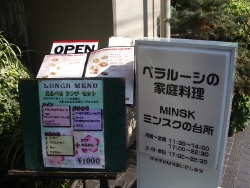
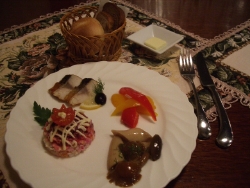
Republic of Belarus - It used to be a part of the former Soviet Union and it achieved nationality after the fall of the Soviet Union. It's been called "Belorussia" for a long time.
When I was in the US, I met a woman from Belarus at a free language school for immigrants (ESL). I got to know the existence of Belarus then. After I came back to Japan, I happened upon a restaurant called "Minsk" when I was walking around the Roppongi area.
I have been interested in this restaurant for several years since then. The other day I opened the door of and entered that restaurant. I didn't imagine that there would be so many Japanese customers.
I had a meat-stuffed cabbage lunch set. It was very, very delicious! I asked Barysiuk Viktoryia, a manager of "Minsk", to have an interview with me shortly after I finished it up. The following is the dialogue with her.
(Interview with Barysiuk Viktoryia, restaurant manager)
Set lunch menu. *Each served for ¥1000 and includes a drink and dessert.
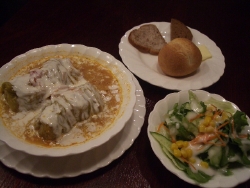
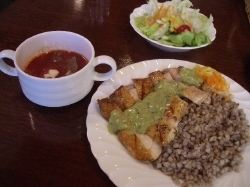
(Left) Meat-stuffed cabbage set.
(Right) Grilled chicken with dill sauce and kasha (steamed buckwheat groats), borscht.
When did you open this restaurant?
In October 2002. So almost seven years have passed since then.
This is the only Belarussian restaurant in Tokyo, right?
Yes. I think a Belarussian restaurant itself is rare in the world.
Don't you have this kind of restaurant even in Belarus?
No. Restaurants in Belarus are much bigger than here and all of them include entertainment. People listen to live music or dance to the music there. Also they want to eat foreign recipes such as shrimps with chili sauce, sushi or French dishes because they can eat their food at home. Moreover, there are few foreigners, even in Minsk, the capital of Belarus.
That means you had no good example when you started your business at all.
No. That's why our big appeal is that we serve Belarussian home cooking. I know about it very well. I grew up in Minsk so I know my family's recipes, my relatives' recipes and my friends' recipes. So we can serve the taste of Minsk. This restaurant's name "Minsk" (*Name in Japanese, "Minsk no daidokoro". Literally means; "the kitchen of Minsk") represents features of this restaurant.
When this restaurant opened, our chef was my older sister. She came to Japan but until she came here, we discussed menu and how to cook recipes over the phone. So the telephone bill was incredibly expensive.
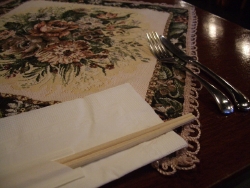
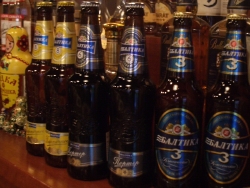
Main business of your parent company is construction. It is quite different from restaurant business, isn't it?
My boss, the CEO of our parent company, is a sixtyish Japanese man. He always looks for an unexplored field. Also he looks for young and energetic people.
We met by chance and I told him that I came from Belarus. He asked, "Belarus is a country?". I was the first Belarussian he had ever met.
He ran a Chinese restaurant when he was young. His parents also worked for a restaurant so he'd been interested in that kind of business for a long time. So he started a coffee shop chain.
But he had no experience of running a foreign cuisine restaurant. He asked, "Is there any Belarussian restaurant here in Japan?" I said, "No". He asked, "But Russian food and Belarussian food is the same, right?" I said, "Well... they are not so different. But food in Hokkaido (Northern Japan) and one in Okinawa (Southern islands of Japan) are different, aren't they?"
They are that different?
Yes. Actually we and Russian people are of the same ethnic group. But we have our own unique history. Belarus is located between Russia and Poland so our culture was influenced by both countries. And originally our country was a part of Poland a long time ago. People spoke the same language there. After Belarus was annexed to Russia, our language merged with Russian. But our language is still similar to Polish. I understand Polish a little bit even though I've not studied it. I can't read or speak it but it sounds understandable for me a little. Polish people also understand us to an extent even if we speak our language.
But our country was merged with Russia after the 19th century so many of us have relatives in Russia and Ukraine. We are a ethnic mixture of different groups.
As for food culture, borscht is originally a Ukrainian traditional cuisine. And Belarussian dishes are similar to Polish ones. But we use the same ingredients as Russian food so our menu is half-understandable for Russian people.
However the potato cuisine and pork stew we serve here are unique to Belarus. For example, we have "cold borscht". It's served every summer. Russian people don't know it at all. To Russians, borscht must be hot. When I served a cold one to a Russian woman, she got angry and asked, "Why is it cold? Please warm it up." But if it's heated, we have to throw it away. They don't know that Belarussian and Russian food are different like that.
But I also didn't know about Russian food very well because I've grown up in Belarus. I didn't imagine that food in Eastern Russia and one in Western Russia are different. But Russian food varies with location. I got to know that there were various ways to cut vegetables or bake vegetables in Russia.
*Dinner menu
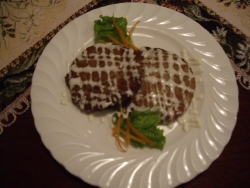
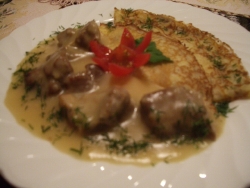
(Left) Potato pancake "draniki" (Right) Sour cream pork stew "machanka"
Your recipes are not adapted to the Japanese palate at all, are they?
Not at all. I want Japanese people to have our taste of home.
When this restaurant opened, we prepared a daily lunch menu and daily specials for dinner. But some didn't suit Japanese tastes. When my boss found some food was left on plates, he asked me why. I answered customers were stuffed and couldn't clear their plates. They told me that. But I was not sure it was true. I didn't know the reason why they left food.
Actually the size of each meal was big for Japanese. Belarussian and Russian people like big things. Buildings, restaurants, tables... everything is big. Food is piled high on each dish.
For example, they prepare a pig roasted whole for a house party. If 20 guests come to a party, a host cook food for 40 people there. They think that guests had satisfied themselves if food is left on their plates. If they finish them up, they want to eat more. That's been their way of thinking for a long time.
Japanese people divide a big-portion meal in four or six ways. On the other hand, we don't share. Each of us orders different ones. Food culture is very different between ours and Japanese.

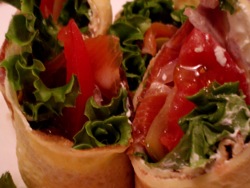
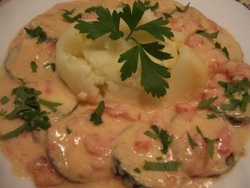
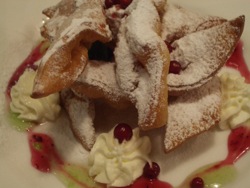
My boss suggested we prepare a small-portion of borscht. But it's not our style because to us, borscht must be poured into a big bowl. So I told him, "Sorry, we can't do that".
But we had to manage to adapt to the Japanese way. We poured borscht into a big bowl first and tried to put it into a smaller one little by little. They are really picky about their cuisine. They want to enjoy Russian/Belarussian food to their hearts' content. If we serve a small portion of borscht to them, they would ask us who is running this restaurant. If they think this is a bad restaurant, notoriety would be spread by word of mouth.
So we almost faced a kind of critical situation. First of all, our menu had to be accepted by Russian/Belarussian people. I've heard that every single foreign food restaurant faces such a difficulty. Not only European but also Indian and Korean restaurants face this kind of problem.
We learned the amount of food, the color of the dishes and arrangement little by little. Then we found the right size for both Japanese and Russian/Belarussian at last.
Russian people like salted food. On the other hand, Japanese love bland raw fish. There is little we can do about the fact that food culture varies with location.
We've cooked and served food and checked how customers felt about it. We repeated that process over and over again and put recipes which had been popular among Japanese people on our menu. Of course those are the same as Russian/Belarussian original recipes so people from Russia/Belarus can also enjoy them. The number of customers have been increasing. We're full almost everyday, both lunch and dinner.
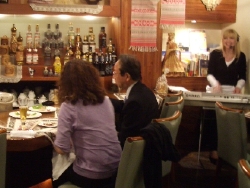
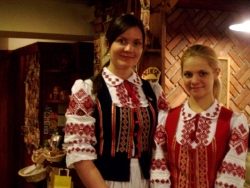
(Left) They have live performances of Ekaterina, a Russian singer from 6:30PM
on Wednesdays.
(Right) Belarussian-attired waitresses welcome you at dinner time every Tuesday, Thursday and Saturday.
Minsk
1-4-2 Azabudai, Minato-ku, Tokyo
(The nearest station: Subway Roppongi Itchome)
Phone/FAX (from overseas) +81-3-3586-6600
(in Japan) 03-3586-6600
Opening hour: 11:30AM - 2PM, 5PM - 11PM
(shop holiday: Sundays and national holidays)
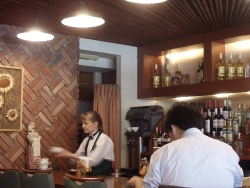
*Interview with Barysiuk Viktoryia...Click here!

 Previous
Previous